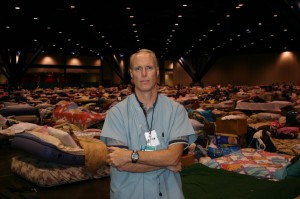Chris Van Gorder, CEO, Scripps Health The busy executive says he’s living his fantasy career

By Gail Stoorza-Gill
Chris Van Gorder oversees all functions of Scripps Health, which operates five acute care hospital campuses, 19 outpatient centers and regional home health care services with more than 2,600 affiliated physicians and 12,700 employees. He also continues to serve the public today as a reserve commander in the San Diego County Sheriff’s Department Search & Rescue Unit and as a licenses emergency medical technician.
As a newly trained police officer, Chris Van Gorder learned an important lesson that has guided him throughout his impressive career. As he says, he was “badge heavy” with an enormous sense of power once he graduated from police officer training. Early on he received a call to come to the scene of a crime, and in his determination get there fast and to demonstrate his very best skills, he very nearly crashed into another police car. That, he says, taught him that getting there first isn’t the most important thing. Getting there is most important.
TRQ: How has this guided you during your time with Scripps Health?
CVG: When I arrived at Scripps in 1999, Scripps was in trouble. It was losing $15 million a year, its medical staffs had voted no confidence in management and employee morale had hit bottom. I knew I had to deal with this crisis with a direct and steady approach. Others wanted me to tackle everything that needed fixing at once. I had to pick the most important things first. To me there were two top priorities:
• Vastly improving the corporate culture.
• Focusing all our efforts on quality and safety.
Our focus now is to continue our change from a hospital to a health care company.
TRQ: You’ve led a somewhat unconventional path to being the head of a $2 billion-plus health care company. Describe that path for us?
CVG: Neither of my parents finished high school until they were adults. My twin brother is a school teacher, and of course I was a cop. I started work in a book store at age 13 and worked for the LAPD Cadet Program during college.
I’ve learned coming up through the ranks. I was fortunate to receive a great education (Van Gorder received his master’s degree in public administration/health services administration at the University of Southern California, completed the Wharton System CEO Program at the University of Pennsylvania and earned his bachelor’s degree from California State University, Los Angeles), but I’ve learned the most from the things I did wrong. I owe a lot to people who worked for me, because they helped me learn my art.
What led me on this path? It began as a hospital patient, when as a police officer I was critically injured during a family dispute call. After a lengthy recovery and starting a new career in hospital security, I continued my education in health care management and kept earning increased responsibility.
TRQ: What is your management philosophy?
CVG: I was once told that I was a micro-manager. I didn’t believe it and was in complete denial until my scope of work grew and I had to give some of it up. I now see my job as keeping the organization going in the same direction. We give people the freedom to do what they do best. Accountability is most important. Everyone has to set their own targets which are then approved by the next level of management. They know they can miss their target once. Miss it twice and they won’t be around for three times. We have an exceptional group in senior management. We haven’t lost anyone in eight years.
TRQ: You’re a very busy guy. How have you kept it all together over the years.
CVG: Rosemary, my wife of nearly 25 years, is very tolerant. We have two boys in college now and two therapy dogs who are both Labrador Retrievers. Rosemary volunteers at our hospital so we sometimes cross paths during the day.
TRQ: How do you view the national health care bill? (Note: This interview was conducted in late December 2009. Here were Chris’s answers.)
CVG: It’s nearly a 3,000-page bill, which affects one-sixth of our economy. I can’t imagine any bill more profound.
The major cost implications are to providers. Doctors will also be impacted. The theory is that the more people who are insured reduce charity.
The current Senate bill won’t start for three years. We must prepare for what could be a very rocky three years. There could be hospital closures, though probably not in San Diego County because we are relatively healthy. There will be a reduction in reimbursements.
We need reform. We are too fragmented, too expensive and there are simply too many people accessing care. But … we are going to end up trying to fix a bad bill for 25 years.
TRQ: Here is the “quick question” shotgun round: What do you watch on TV?
CVG: Light stuff like “Two and ½ Men,” re-runs of “Frazier.”
TRQ: Favorite restaurants?
CVG: Ruth’s Chris, Chili’s, almost anything Italian.
TRQ: What is your fantasy career?
CVG: I’m living it. Particularly so because at Scripps we are blessed with a great board of trustees who provide superior governance.
TRQ: Most valued possession?
CVG: My family and friendships and our photographs. I’ve been digitizing all the photos.
TRQ: Best advise you’ve received?
CVG: Rosemary’s father gave me great counsel. My own Dad said, “Whatever you do in life, don’t steal from the hands that feed you. They don’t owe you anything. You owe that loyalty to them.”
TRQ: What’s next for you at Scripps?
CVG: I’d like to finish my career here. There are bigger jobs, but I can’t imagine a better job. The health care company that we’re building will one day take care of me. I look forward to building what Ellen B. Scripps wanted us to be: we will be likened to Cleveland Clinic and the Mayo Clinic in the not-so-distant future.
TRQ: What most needs to be created/changed in San Diego in order to realize our old tagline, “America’s Finest City”?
CVG: We must get our economics straightened out. To do so we need to develop an incremental strategy and plan with a goal for a fixed time in the future. We must not try to fix it all at once.
Gail Stoorza-Gill is an independent marketing consultant and serves on the boards of Security Business Bank of San Diego and voiceofsandiego.org. Send your ideas for prospective people to feature to gailstoorza@cox.net or call (619) 223-4815.

